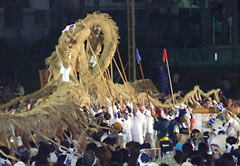Appealing to tradition, Ginowan holds tug-of-war for the second time since WWII

On July 29, at Okinawa International University, participants about to take part in the tug-of-war dedicated to the safety and prosperity of the local community.
August 3, 2012 Ryukyu Shimpo
On July 27, at Okinawa International University, a traditional-style tug-of-war was held for just the second time since WWII. Representing the desire for the safety and prosperity of local people, it was revived in 2007, and having re-established itself again in the community, from now on it will take place every five years.
The tug-of-war was held between teams from the opposite sides of the main street in Ginowan – the South, “Mendakari,” against the North, “Kushindakari,” with the northern team achieving its first ever victory since the event started before the war. The atmosphere at the event was transformed into a frenzy of excitement the moment that the ropes were connected, with both teams pulling as hard as they could on the rope.
“I couldn’t be happier,” said Koshun Tokeshi, Kushindakari’s team leader. Historically, the Mendakari (southern) team has always had an advantage by attracting more participants, because the southern side of the street is closer to where the event is held, and also, so the story goes, because they use a “male rope.” After the tug-of-war the winner’s flag is raised by all of the people who took part, in what is called the murui-jina ceremony, which is unique to this event.
Before and after the pull, the hatagashira gae, a special ritual ceremony was also held to pray for fertility, and a dance was performed. Members of the Society for Performing Arts and Literature of Ryukyu from Okinawa International University also performed. Kiyoshi Nakamura, the head of the Ginowan Residents Association said, “This event was made possible thanks to the efforts in organization over a twelve-month period by a total of 900 staff and volunteers, and of course because of the large number of people who turned up to take part.”
(English translation by T&CT, Kyoko Tadaoka and Mark Ealey)
Previous Article:Kinkomokuzetsu: Column Peru in Koza
Next Article:Children on bank work experience say, “100 million yen was heavy”
[Similar Articles]
- The Great Tug-of-War of Ginowan
- 270,000 people take part in huge tug of war in Naha
- Rope breaks for the first time at annual Great Tug-of-War
- “I Lost My Voice:” Naha’s Giant Tug-of-War Unites Tourists and Locals
- Excitement around 43-ton giant rope
 Webcam(Kokusai Street)
Webcam(Kokusai Street)


